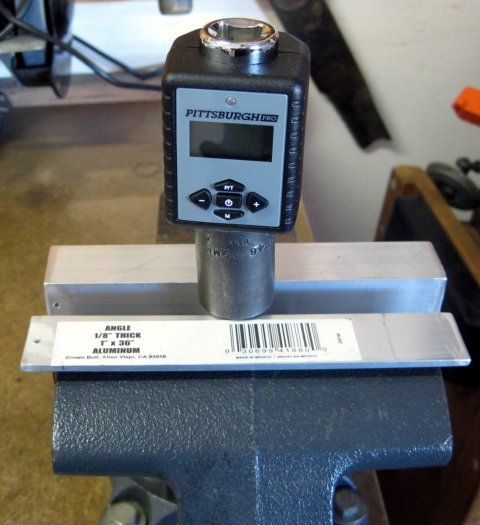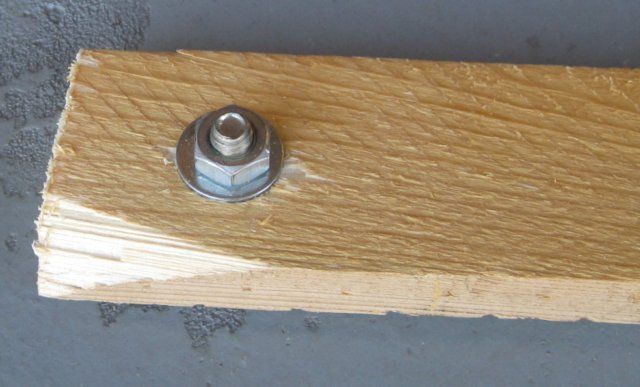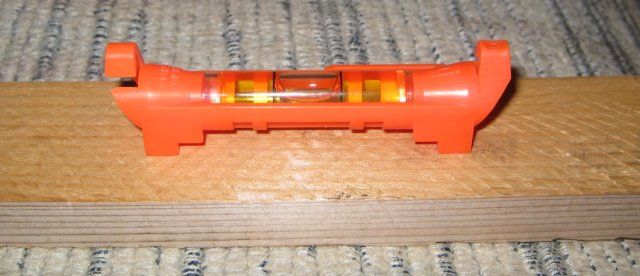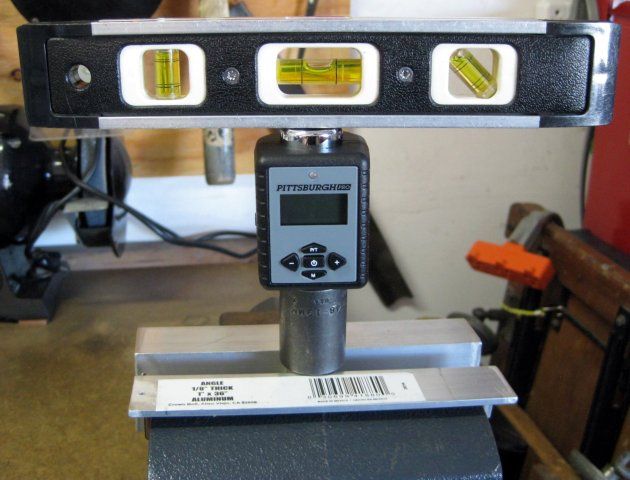Thought I'd pass on an inexpensive and easy way to calibrate your torque wrenches.
I've known about this Harbor Freight Digital Torque Adapter for a while now:

I wasn't really interested in using it for actual torque duties, but I thought it would be a great way to calibrate my torque wrenches. What kept me from pulling the trigger was the fact that it is advertised as having a range of 29.5 to 147.6 ft-lbs, putting it out of range for most fasteners encountered when working on motorcycles.
So I thought......then I stumbled across this tidbit:
http://blog.paladinmicro.com/archives/cat_burgman400.html
It seems as if the torque adapter is reasonably accurate down to about 4 ft-lbs when used as a calibration device.
So, I picked one up. It was on sale at my local HF store for about $31.00. Use one of the ubiquitous 20% off HF coupons and Bob's your uncle.....
To prep for my torque wrench calibration-fest, I plugged a 19mm impact socket onto the digital torque adapter's ?? drive square, then put a piece of 19mm hex stock into said socket:

Then, the whole shebang got put into my bench vise:

It was then trivial to use the setup to calibrate my various torque wrenches using the digital torque adapter's ?peak torque? function, whereby the peak torque value attained during a swing is saved on the screen.
I was able to calibrate all four of my torque wrenches (details on how I calibrated my smallest torque wrench, with a 0-60 in-lb range, are below). For the record, I was able to determine that two of my torque wrenches were adequate (my 0-60 in-lb KD and ancient PowrKraft (Montgomery Ward!) 0-150 ft-lb torque wrenches), one was stellar (my 0-200 in-lb Matco), and one sucked (my 0-600 in-lb, no-name torque wrench bought years ago from JC Whitney when I was stationed overseas). I trashed the no-name wrench and replaced it with a 0-600 in-lb KD torque wrench that ended up being adequate in its accuracy. The most common error seen by far was the case whereby the torque wrench overstated the torque that is being applied. I can live with that, since I use Anti-Seize on lots of my fasteners.....
For the majority of you, that is all you will care to know and you can quit reading now. Only if you are anal enough to want to calibrate a 0-60 in-lb torque wrench will you want to read on.
Since the digital torque adapter will not display torque values below about 3.7 ft-lb or so, I needed to construct a special adapter that would allow me to calibrate my 0-60 in-lb torque wrench.
I started out with a long piece of scrap lumber. The mathematics of the situation dictated that I needed a piece that was at least three times as long as the effective moment arm of my little torque wrench.
To one end of said piece of wood, I used a bolt and an old conduit hangar to fix a ⅜? drive breaker bar:

This would be the end of the tool that would engage with the digital torque adapter.
To the other end of said piece of wood, I put a nut and bolt:

This would be the end of the tool that would engage with my small torque wrench.
Here is a look at the entire tool:

Here is a look at the tool with the small torque wrench engaged:

When actually running the test, I wanted to keep things square and level. I used a small string-leveler to make sure that the long piece of wood was level:

Likewise, I used a torpedo level to make sure that the digital torque adapter assy was set squarely into the bench vise:

The math required is left as an exercise for the student......
I've known about this Harbor Freight Digital Torque Adapter for a while now:

I wasn't really interested in using it for actual torque duties, but I thought it would be a great way to calibrate my torque wrenches. What kept me from pulling the trigger was the fact that it is advertised as having a range of 29.5 to 147.6 ft-lbs, putting it out of range for most fasteners encountered when working on motorcycles.
So I thought......then I stumbled across this tidbit:
http://blog.paladinmicro.com/archives/cat_burgman400.html
It seems as if the torque adapter is reasonably accurate down to about 4 ft-lbs when used as a calibration device.
So, I picked one up. It was on sale at my local HF store for about $31.00. Use one of the ubiquitous 20% off HF coupons and Bob's your uncle.....
To prep for my torque wrench calibration-fest, I plugged a 19mm impact socket onto the digital torque adapter's ?? drive square, then put a piece of 19mm hex stock into said socket:

Then, the whole shebang got put into my bench vise:

It was then trivial to use the setup to calibrate my various torque wrenches using the digital torque adapter's ?peak torque? function, whereby the peak torque value attained during a swing is saved on the screen.
I was able to calibrate all four of my torque wrenches (details on how I calibrated my smallest torque wrench, with a 0-60 in-lb range, are below). For the record, I was able to determine that two of my torque wrenches were adequate (my 0-60 in-lb KD and ancient PowrKraft (Montgomery Ward!) 0-150 ft-lb torque wrenches), one was stellar (my 0-200 in-lb Matco), and one sucked (my 0-600 in-lb, no-name torque wrench bought years ago from JC Whitney when I was stationed overseas). I trashed the no-name wrench and replaced it with a 0-600 in-lb KD torque wrench that ended up being adequate in its accuracy. The most common error seen by far was the case whereby the torque wrench overstated the torque that is being applied. I can live with that, since I use Anti-Seize on lots of my fasteners.....
For the majority of you, that is all you will care to know and you can quit reading now. Only if you are anal enough to want to calibrate a 0-60 in-lb torque wrench will you want to read on.
Since the digital torque adapter will not display torque values below about 3.7 ft-lb or so, I needed to construct a special adapter that would allow me to calibrate my 0-60 in-lb torque wrench.
I started out with a long piece of scrap lumber. The mathematics of the situation dictated that I needed a piece that was at least three times as long as the effective moment arm of my little torque wrench.
To one end of said piece of wood, I used a bolt and an old conduit hangar to fix a ⅜? drive breaker bar:

This would be the end of the tool that would engage with the digital torque adapter.
To the other end of said piece of wood, I put a nut and bolt:

This would be the end of the tool that would engage with my small torque wrench.
Here is a look at the entire tool:

Here is a look at the tool with the small torque wrench engaged:

When actually running the test, I wanted to keep things square and level. I used a small string-leveler to make sure that the long piece of wood was level:

Likewise, I used a torpedo level to make sure that the digital torque adapter assy was set squarely into the bench vise:

The math required is left as an exercise for the student......
Last edited:


